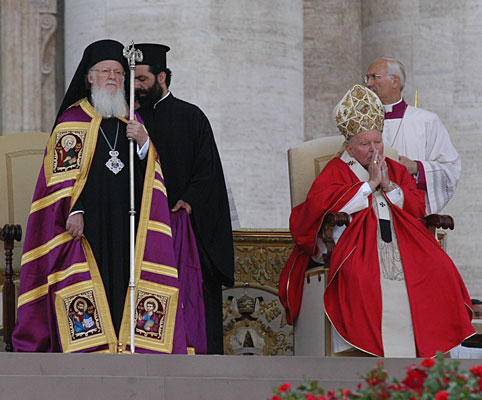First, he made it his priority, in line with the express wishes of the Second Vatican Council
 Second, he realized that part of the task of seeking unity with the East depended on something he advocated from the beginning of his papacy: the healing of memories. He himself put this into practice with Eastern Christians most memorably and movingly in 2001 when he visited Greece and in a dramatic gesture asked forgiveness
Second, he realized that part of the task of seeking unity with the East depended on something he advocated from the beginning of his papacy: the healing of memories. He himself put this into practice with Eastern Christians most memorably and movingly in 2001 when he visited Greece and in a dramatic gesture asked forgivenessI have elsewhere in several places analysed this notion of the healing of memories, but it remains as important today as when he first began to talk about it. Indeed, the newly elected patriarchal head of the Ukrainian Greco-Catholic Church has recently spoken eloquently about how important such healing remains for more than a few Eastern Christians who seem, perversely, to be unwilling to let go of those memories of hurts, whether real or imagined, but hang on to them as an excuse not to have to be united with the still-hated Catholic Church. I have seen proof of that only this week in a few fanatics elsewhere attacking my book, Orthodoxy and the Roman Papacy: Ut Unum Sint and the Prospects of East-West Unity
which they proudly--perversely--claim not to have read because it is a work of "ecumenism," that supposed "pan-heresy." O la fatigue du Nord! Such an attitude is--more than being predictable, tedious, and silly--really very sad because it evidences no desire to do what the Lord wants by seeking unity. Such people are perversely content not merely to hang on to their hurts but to lash out at anyone who suggests we have no choice but to press for unity.
But what type of unity? That is the real question. As those who will actually bestir themselves to read the book
How could such unity ever come to pass? Some assert--even the more hopeful--that while we may have resolved the filioque
But that notion fails to grapple with the third part of the legacy of Pope John Paul II: his genuine request for helpful responses to his real and acute question in Ut Unum Sint:
I insistently pray the Holy Spirit to shine his light upon us, enlightening all the Pastors and theologians of our Churches, that we may seek—together, of course—the forms in which this ministry may accomplish a service of love recognized by all concerned." This is an immense task, which we cannot refuse and which I cannot carry out by myself. Could not the real but imperfect communion existing between us persuade Church leaders and their theologians to engage with me in a patient and fraternal dialogue on this subject, a dialogue in which, leaving useless controversies behind, we could listen to one another, keeping before us only the will of Christ for his Church and allowing ourselves to be deeply moved by his plea "that they may all be one ... so that the world may believe that you have sent me" (Jn 17:21)?My Orthodoxy and the Roman Papacy: Ut Unum Sint and the Prospects of East-West Unity




